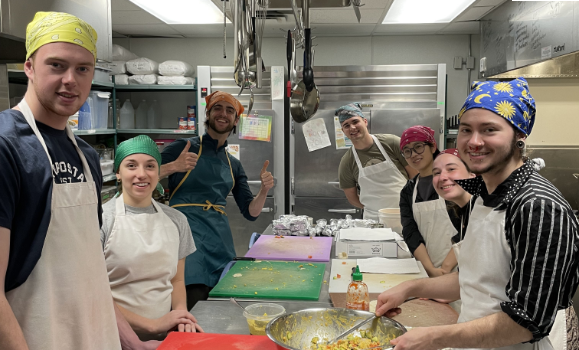News
» Go to news mainBridging campuses with a hands‑on sustainability course

by Anastasiia Merkureva
Imagine ten days of immersive learning, with outdoor sessions and just a handful of classmates. You discover sustainability challenges through meetings with local non-profits, community leaders, academics, and companies. Welcome to Measuring Food Sustainability – an intensive interdisciplinary cross-campus course.
Launched last year, this course is open to third-year students of various programs. Over ten days, students split their time evenly between Halifax and Truro campuses. Laurel Schut and Paul Manning, the course co-creators, explained they wanted to bridge the gap between campuses.
“It's only an hour and a half away, but sometimes it feels like a bit of a distance,” explained Schut. “We wanted to show students what is happening on our other campuses, including cool research and student-led initiatives.”
To make the elective as applicable as possible, the co-creators collaborated with a variety of food stakeholders and experts in both towns.
“We've tried to have a range of organizations, viewing sustainability from different angles,” explained Schut. “Some look at food sustainability through a social lens, some through a biophysical. Some through a very quantitative lens, some - through economic.”
This year's collaborators range from small producers like the student-run Cultiv8 garden and family-owned Folly River Farm to non-profits like Loaded Ladle and Hope Blooms.
 The students read extensively to prepare for the classes, which are divided between in-class discussions with faculty collaborators and outdoor field trips, where students learn from field site experiences and take field notes.
The students read extensively to prepare for the classes, which are divided between in-class discussions with faculty collaborators and outdoor field trips, where students learn from field site experiences and take field notes.
“The field visits were fantastic,” shared Manning. “We were able to connect with a lot of interesting people and organizations. Those were valuable learning experiences for our students and for us.”
Rhydian Crawford, a Plant Science student took the Food Sustainability course this year and said “learning in both Halifax and Truro allowed us to explore how sustainability is shaped by the individual community and their needs. Part of what made the experience so valuable was the chance to immediately compare the issues faced by different groups.”
At the core of the course is a food sustainability challenge. Students form groups to assess the sustainability of a range of food products. They set criteria for evaluation, develop a measurement matrix, and rank foods, identifying the most and least sustainable options. On the final day of the course, they present their analyses, explain their criteria choices and research outcomes.
“This course showed us how difficult measuring food sustainability is and how conclusions can change drastically based upon whose perspective you measure from and the units that are used,” said Jory Parsons, an Environment, Sustainability and Society student.
Classmates bonded beyond the classroom walls. In Halifax, they admired the Public Gardens, and in Truro, the group went birdwatching for chimney swifts.
If you are a second-year Dal student eager to dive into the world of food sustainability and get to know Dal beyond your home campus, consider joining the course next spring.
Recent News
- Fall 2024 Brightspace Course Spaces
- Assistant Registrar ‑ Recruitment, Special Events, and Campus Tours,
- Certificate of Appreciation – Public Health
- Theatre props available
- Transforming Poultry Care with Artificial Intelligence
- New Face on Campus
- Chloe Toombs ‑ Combining agriculture and engineering
- Dalhousie's HCFAI Webinar ~ Pioneering the Future of Digital Animal Farming
